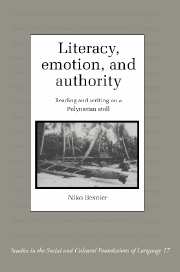Book contents
- Frontmatter
- Contents
- List of illustrations and tables
- Acknowledgments
- Transcription conventions and orthography
- 1 Introduction
- 2 The ethnographic context
- 3 The domains of reading and writing
- 4 Letter writing and reading
- 5 Letters, economics, and emotionality
- 6 Between literacy and orality: the sermon
- 7 Literacy, truth, and authority
- 8 Conclusion
- Notes
- References
- Index of Tuvaluan words
- General index
1 - Introduction
Published online by Cambridge University Press: 14 August 2009
- Frontmatter
- Contents
- List of illustrations and tables
- Acknowledgments
- Transcription conventions and orthography
- 1 Introduction
- 2 The ethnographic context
- 3 The domains of reading and writing
- 4 Letter writing and reading
- 5 Letters, economics, and emotionality
- 6 Between literacy and orality: the sermon
- 7 Literacy, truth, and authority
- 8 Conclusion
- Notes
- References
- Index of Tuvaluan words
- General index
Summary
Anthropological perspectives on literacy
Literacy has occupied a central position in the historical development of anthropological thought. During the formative decades of the field and its allied disciplines, literacy was implicated, more or less explicitly, as a determinant of differences between “civilized” and “primitive” thought and action (Durkheim and Mauss 1903, Maine 1873, McLennan 1876, Tylor 1874), scientific mentalities and prelogical thinking (Cassirer 1946, Lévy-Bruhl 1910, Luria 1976), open and closed systems (Popper 1959), pensée domestiquée and pensée sauvage (Lévi-Strauss 1962), and context-free and context-bound cognitive processes (Vygotsky 1962). Until the turn of the twentieth century, pointing to literacy as the pivot between “us” and “them” was a relatively simple task: literacy was defined as a more or less exclusive feature of Western life. Where it existed in the non-Western world, it had characteristics that gave it an inferior quality: for example, it was thought that learning to read and write in China required years of apprenticeship because of the apparently complex and unwieldy nature of the writing system. Similarly, in much of the Islamic world, literacy was described as being in the exclusive hands of a social élite, which prevented it from giving rise to an enlightened society. Only in the West, early anthropologists maintained, did literacy reach its apogee and thus enable the “general improvement of mankind by higher organization of the individual and of society, to the end of promoting at once man's goodness, power, and happiness,” as Tylor defined the rise to “civilization” (1874:1:27).
- Type
- Chapter
- Information
- Literacy, Emotion and AuthorityReading and Writing on a Polynesian Atoll, pp. 1 - 20Publisher: Cambridge University PressPrint publication year: 1995

